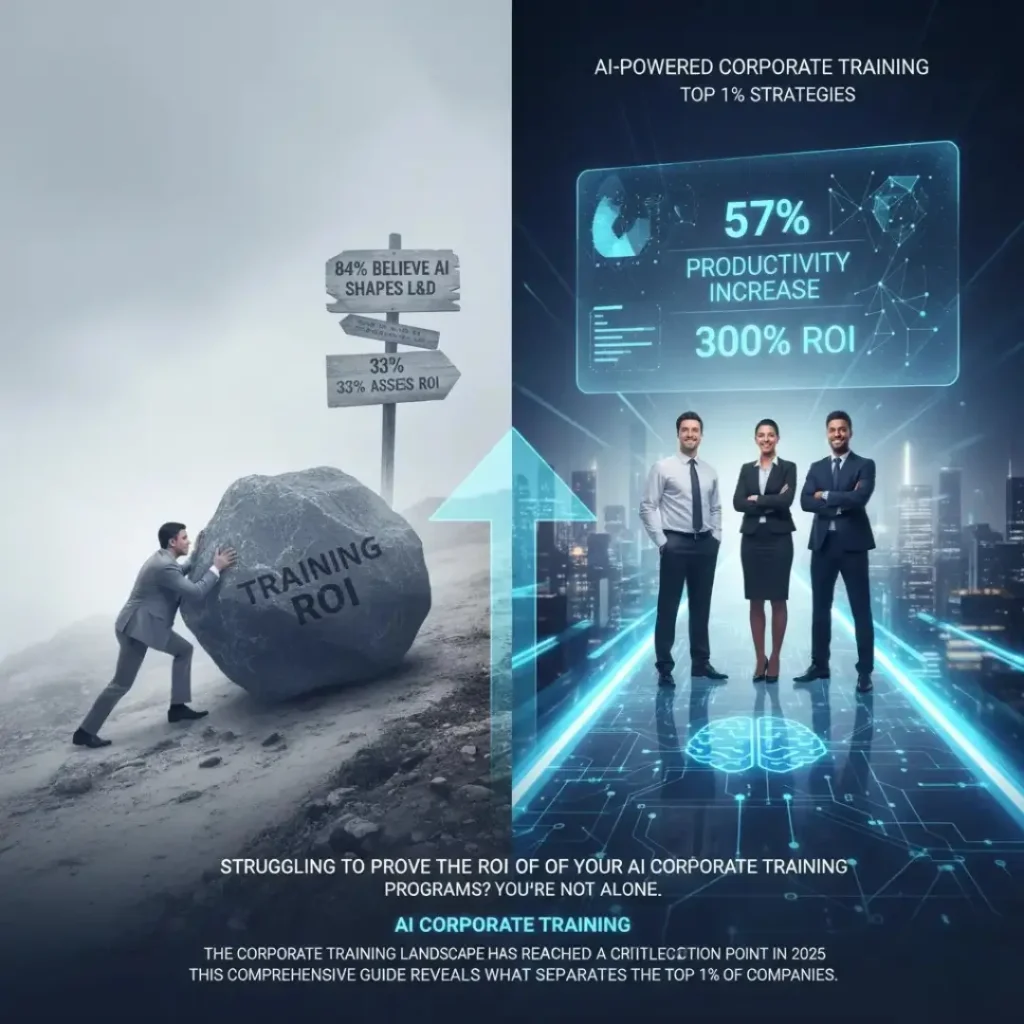
Struggling to prove the ROI of your corporate training in AI programs? You’re not alone. While 84% of L&D professionals believe AI will significantly shape their learning strategies , only 33% of organizations formally assess training ROI , leaving most leaders fighting an uphill battle to justify their investments.
The corporate training landscape has reached a critical inflection point in 2025. Leading organizations aren’t just implementing AI—they’re leveraging artificial intelligence to deliver personalized corporate training at scale, achieving 57% productivity increases and generating 300% ROI on their training investments. This comprehensive guide reveals exactly what separates the top 1% of companies from the rest when it comes to AI-powered corporate training.
The AI Corporate Training Revolution: Beyond Traditional Learning
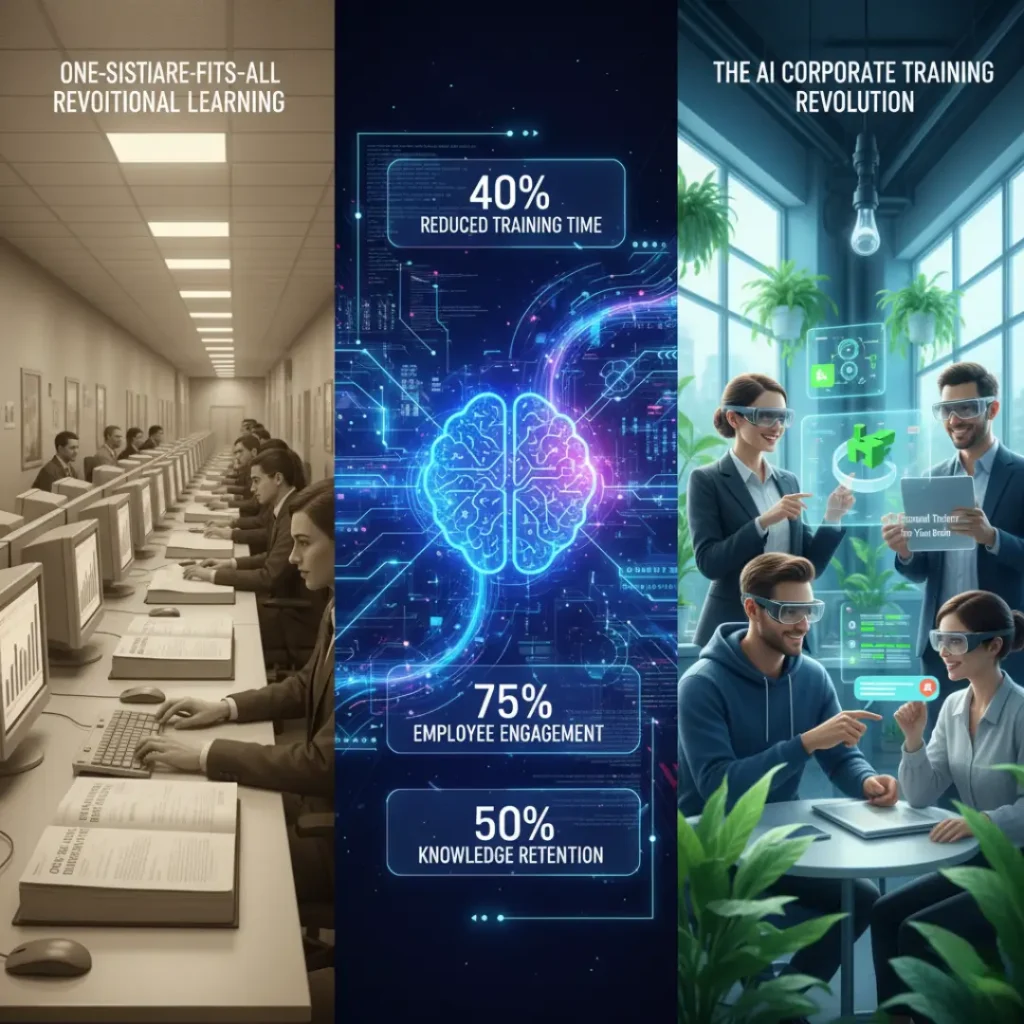
The shift from one-size-fits-all training to AI corporate training represents more than technological advancement—it’s a fundamental reimagining of how organizations develop talent. Unlike traditional corporate training programs that force employees through identical learning paths, AI in corporate training programs creates dynamic, adaptive experiences tailored to individual needs.
What makes AI corporate training different? Think of it as having a personal trainer for your brain—one that never gets tired, remembers everything about how you learn best, and can simultaneously help thousands of employees. This technology leverages machine learning algorithms that improve with use, natural language processing for conversational learning, and predictive analytics to identify knowledge gaps before they become problems.
The numbers speak volumes: companies implementing AI-driven training have reduced training time by 40% while ensuring employees are better equipped. More importantly, these organizations report a 75% increase in employee engagement and 50% improvement in knowledge retention.
How Top Companies Implement AI Powered Corporate Training Tools
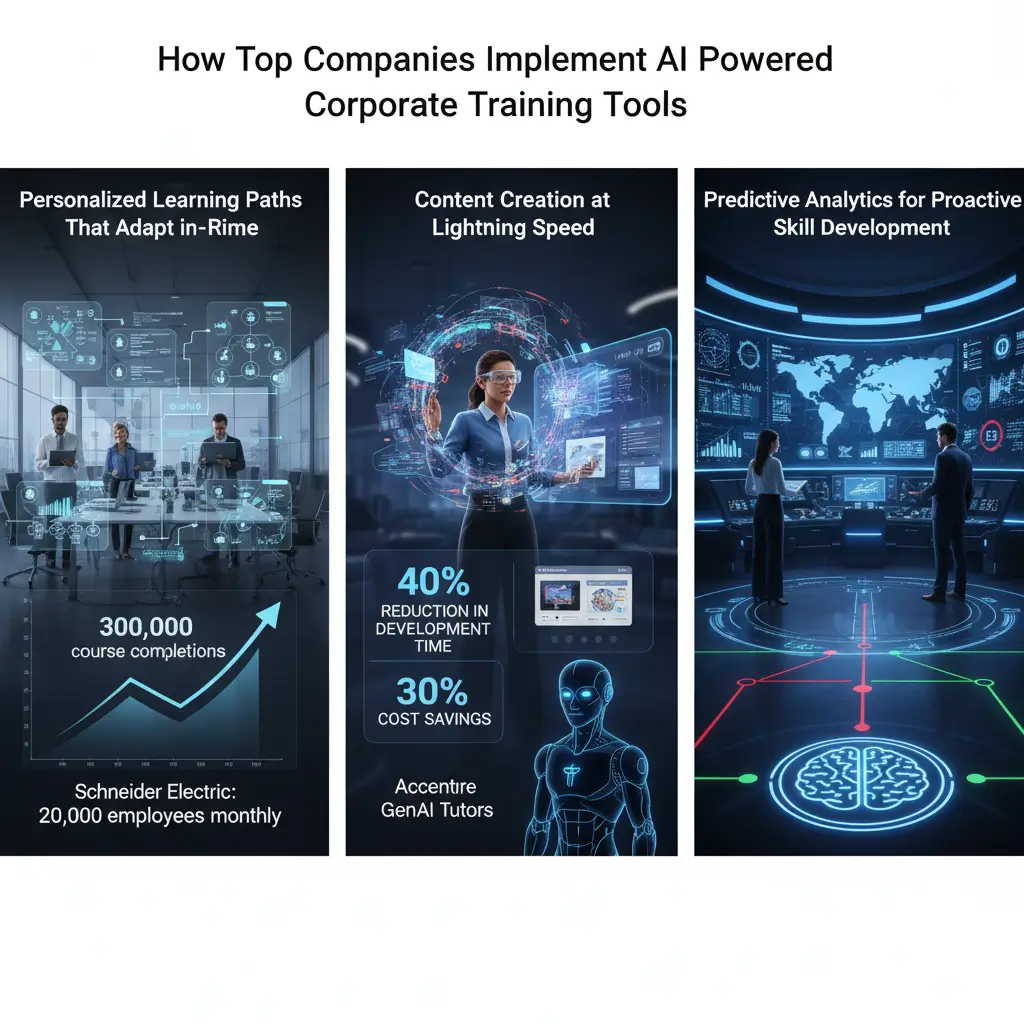
Personalized Learning Paths That Adapt in Real-Time
Leading organizations are moving beyond static training modules to create personalized corporate training via AI that adjusts based on individual performance. Schneider Electric exemplifies this approach, with over 20,000 employees utilizing their AI-powered platform monthly, resulting in 300,000 training course completions.
The key differentiator lies in AI’s ability to analyze employee data—performance metrics, skill assessments, learning preferences—and automatically generate tailored learning recommendations. This creates learning experiences that adapt not just at the organizational level, but down to the individual employee.
Content Creation at Lightning Speed
One of the most transformative applications of best AI corporate training platforms is automated content generation. What previously took weeks—creating training videos, assessments, microlearning modules, or complete learning paths—can now be accomplished in minutes.
Organizations like Accenture have launched GenAI Tutors powered by Stanford Online content, enabling real-time, interactive learning for business and technology leaders. This approach has proven so effective that companies report 40% reductions in content development time and 30% cost savings.
Predictive Analytics for Proactive Skill Development
The most sophisticated corporate AI learning solutions don’t just respond to current training needs—they predict future requirements. By analyzing job market trends, internal performance data, and industry developments, AI systems can identify emerging skill gaps before they impact business performance.
This predictive capability enables organizations to implement AI training for employees that addresses tomorrow’s challenges today, creating a competitive advantage through proactive workforce development.
Measuring Success: ROI Metrics That Matter
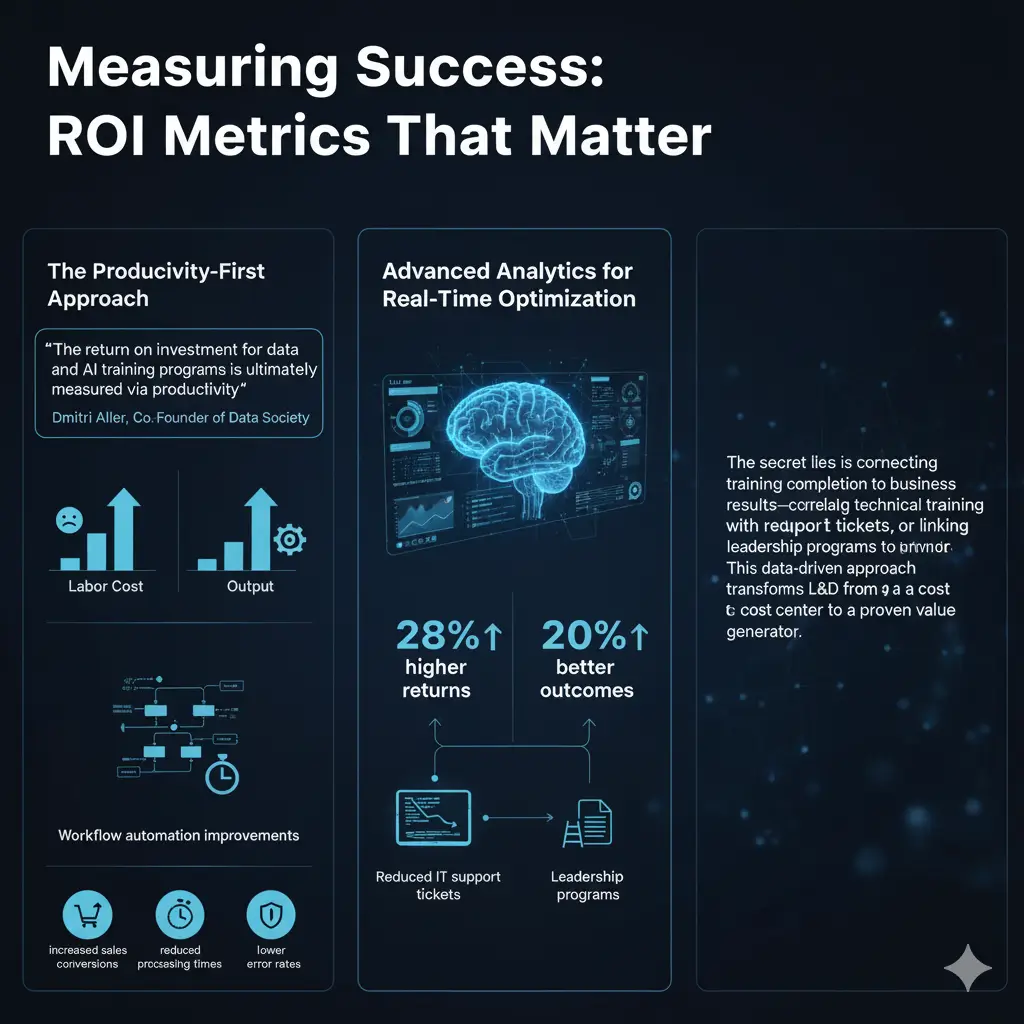
The Productivity-First Approach
According to Dmitri Adler, Co-Founder of Data Society, “The return on investment for data and AI training programs is ultimately measured via productivity”. The most successful organizations focus on tracking tangible outcomes:
- Labor cost vs. output analysis: Comparing employee efficiency before and after AI training implementation
- Workflow automation improvements: Measuring time saved through AI-powered task automation
- Key business KPIs: Tracking metrics like reduced processing times, increased sales conversions, and lower error rates
Advanced Analytics for Real-Time Optimization
Top-performing organizations leverage AI driven employee training platforms that provide comprehensive analytics. Companies using these systems report 28% higher returns and 20% better outcomes compared to traditional training approaches.
The secret lies in connecting training completion to business results—correlating technical training with reduced IT support tickets, or linking leadership programs to promotion rates. This data-driven approach transforms L&D from a cost center to a proven value generator.
You Must Know
Toughest Exam in India: Top 10 Most Difficult Tests for UPSC, IIT, and Medical Aspirants
Azure Administrator Roles and Responsibilities: A Complete Guide 2025
Overcoming Common L&D Pain Points with AI
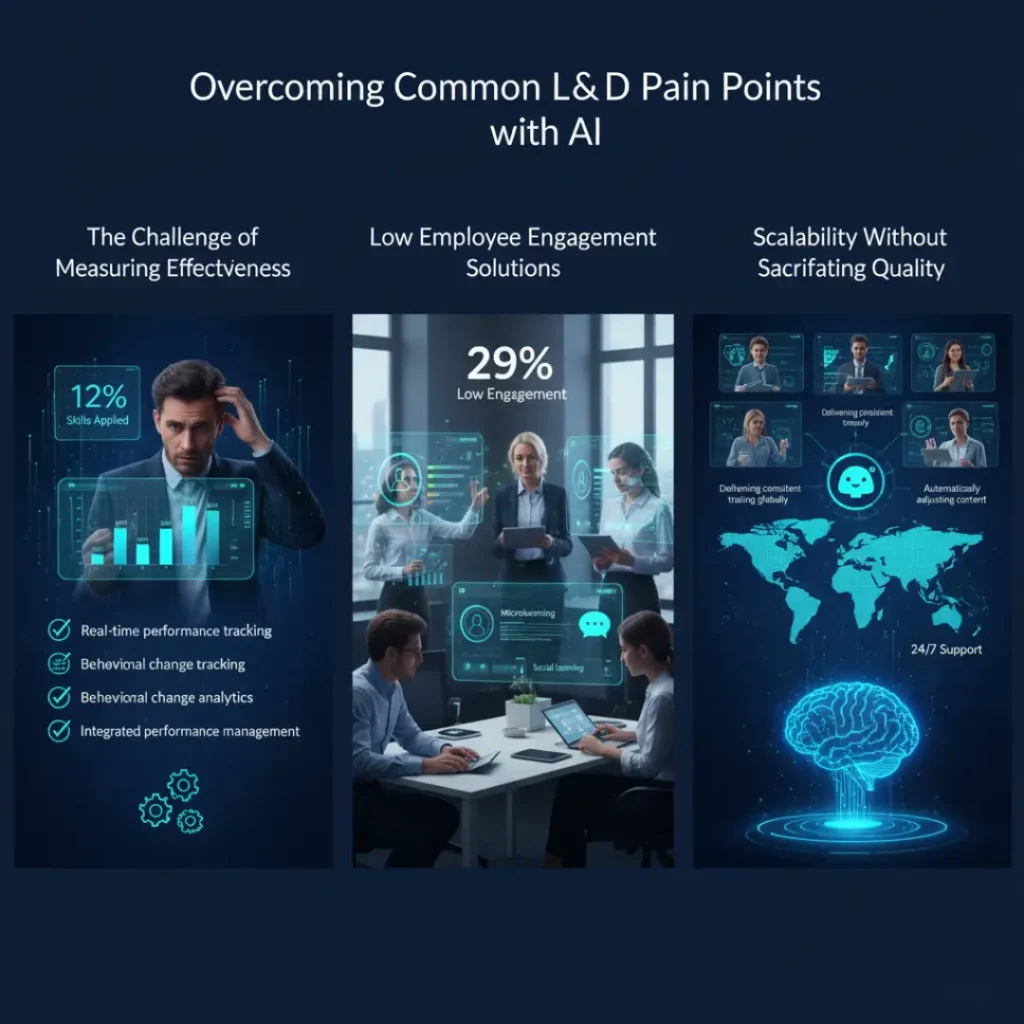
The Challenge of Measuring Training Effectiveness
One of the biggest pain points for L&D managers is proving training impact, with only 12% of employees applying new skills learned in training to their jobs. AI addresses this challenge through:
- Real-time performance tracking: Continuous monitoring of skill application in the workplace
- Behavioral change analytics: AI-powered assessment of workplace behavior modifications post-training
- Integrated performance management: Linking training outcomes to existing performance review systems
Low Employee Engagement Solutions
With 29% of organizations citing learner engagement as their top post-pandemic challenge , AI-powered platforms offer compelling solutions:
- Gamification elements: AI-driven rewards systems and interactive challenges
- Microlearning delivery: Bite-sized content delivered at optimal times
- Social learning features: AI recommendations for peer collaboration and knowledge sharing
Scalability Without Sacrificing Quality
Traditional training programs struggle with the scalability trilemma—maintaining quality while accommodating growing employee numbers within resource constraints. Future of corporate training AI solutions break this limitation by:
- Delivering consistent training experiences across global organizations
- Automatically adjusting content complexity based on learner proficiency
- Providing 24/7 support through AI-powered chatbots and virtual assistants
Implementation Strategies for Maximum Impact
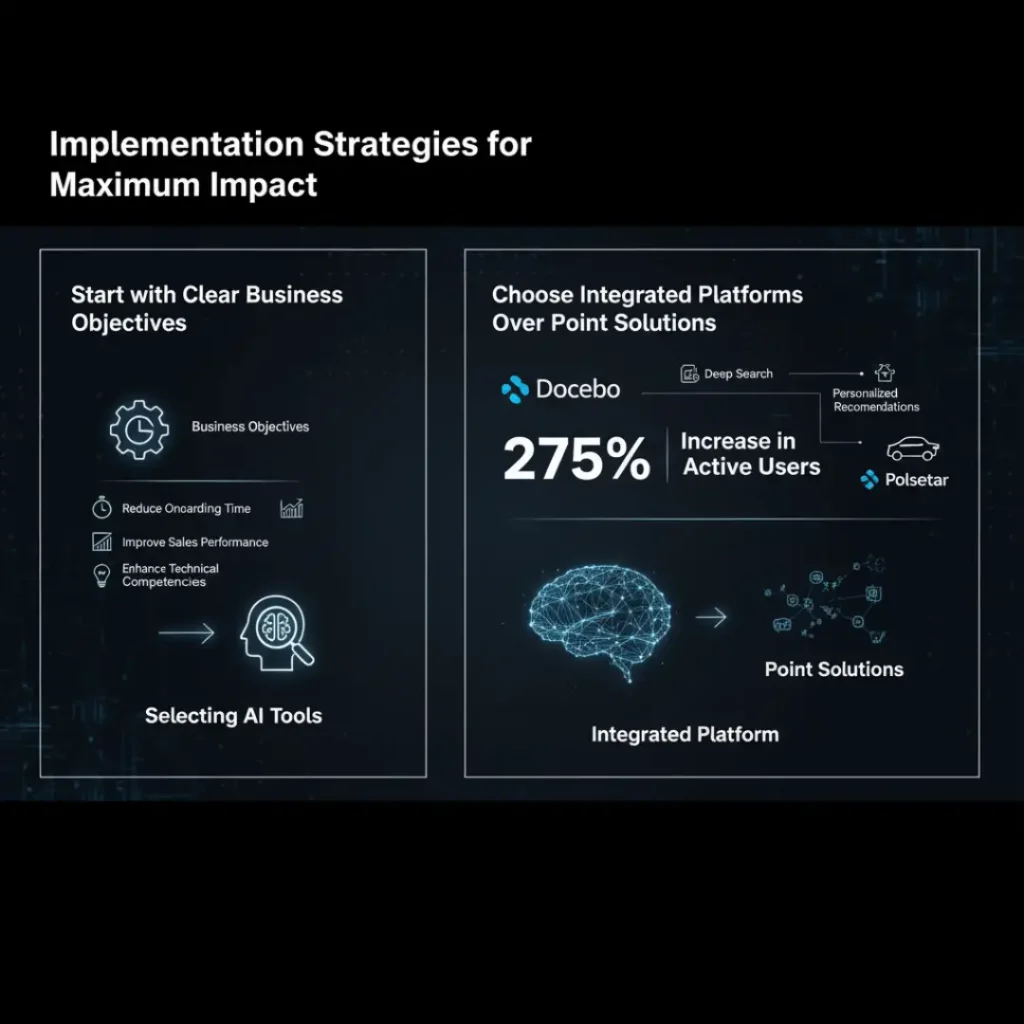
Start with Clear Business Objectives
The most successful AI corporate training implementations begin with crystal-clear alignment to business outcomes. Organizations should establish specific KPIs—whether reducing onboarding time, improving sales performance, or enhancing technical competencies—before selecting AI tools.
Choose Integrated Platforms Over Point Solutions
Leading companies favor comprehensive AI corporate training platforms that combine multiple capabilities rather than assembling disparate tools. Platforms like Docebo, with its AI-powered Deep Search and personalized recommendations , or Sana Learn, which achieved 275% increases in active users for clients like Polestar , demonstrate the power of integrated approaches.
Focus on Change Management
The most sophisticated AI technology fails without proper change management. Top organizations invest heavily in:
- Leadership buy-in: Securing executive sponsorship for AI training initiatives
- User adoption strategies: Comprehensive communication about AI benefits and usage
- Continuous feedback loops: Regular collection and implementation of user suggestions
The Future Landscape: What’s Next for AI Corporate Training
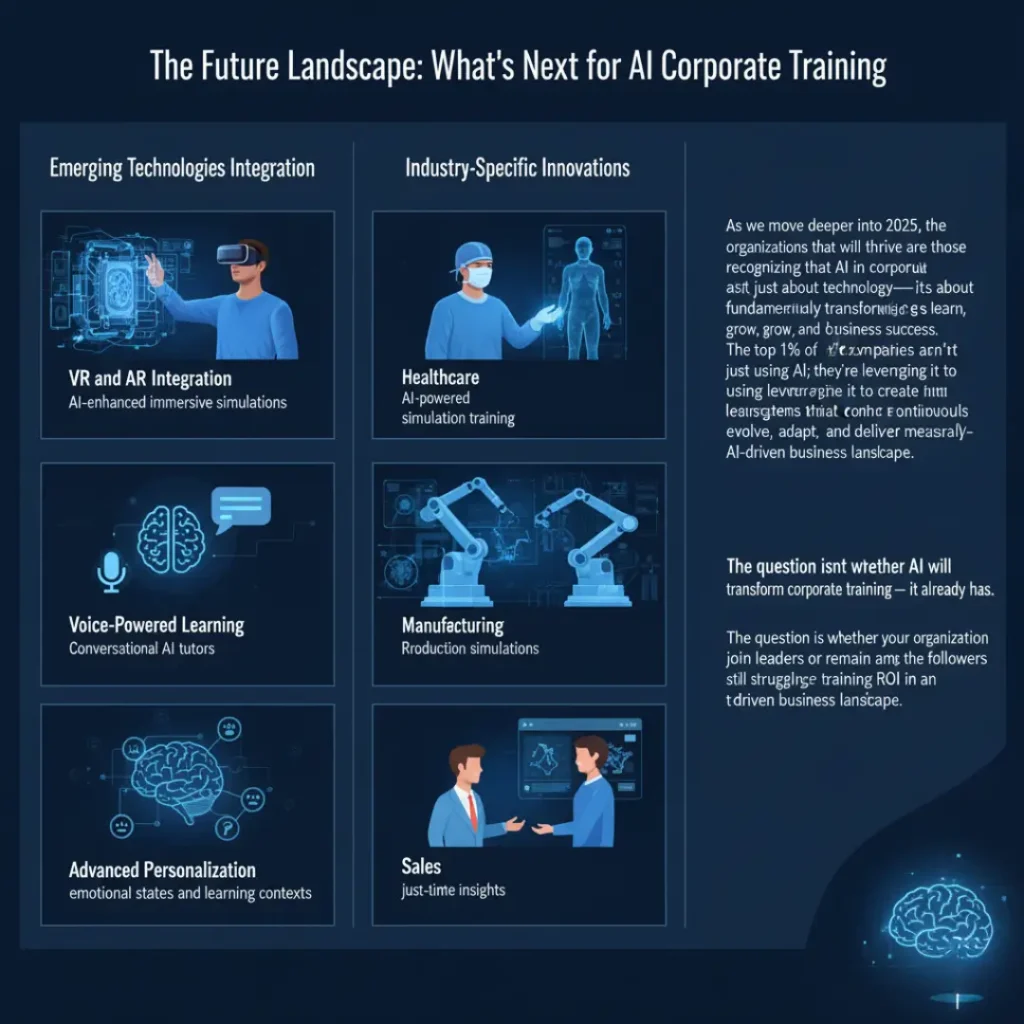
Emerging Technologies Integration
The convergence of AI with other technologies is creating unprecedented opportunities:
- VR and AR Integration: AI-enhanced immersive simulations for hands-on training
- Voice-Powered Learning: Conversational AI tutors for natural language interaction
- Advanced Personalization: AI that adapts not just to individual needs but emotional states and learning contexts
Industry-Specific Innovations
Different sectors are developing specialized applications of AI driven employee training:
- Healthcare: AI-powered medical simulation training with risk-free practice environments
- Manufacturing: Real-world production simulations for skills development
- Sales: AI coaches providing just-in-time insights for customer interactions
As we move deeper into 2025, the organizations that will thrive are those recognizing that AI in corporate training isn’t just about technology—it’s about fundamentally transforming how employees learn, grow, and contribute to business success. The top 1% of companies aren’t just using AI; they’re leveraging it to create learning ecosystems that continuously evolve, adapt, and deliver measurable business value.
The question isn’t whether AI will transform corporate training—it already has. The question is whether your organization will join the leaders or remain among the followers still struggling to prove training ROI in an increasingly AI-driven business landscape.
